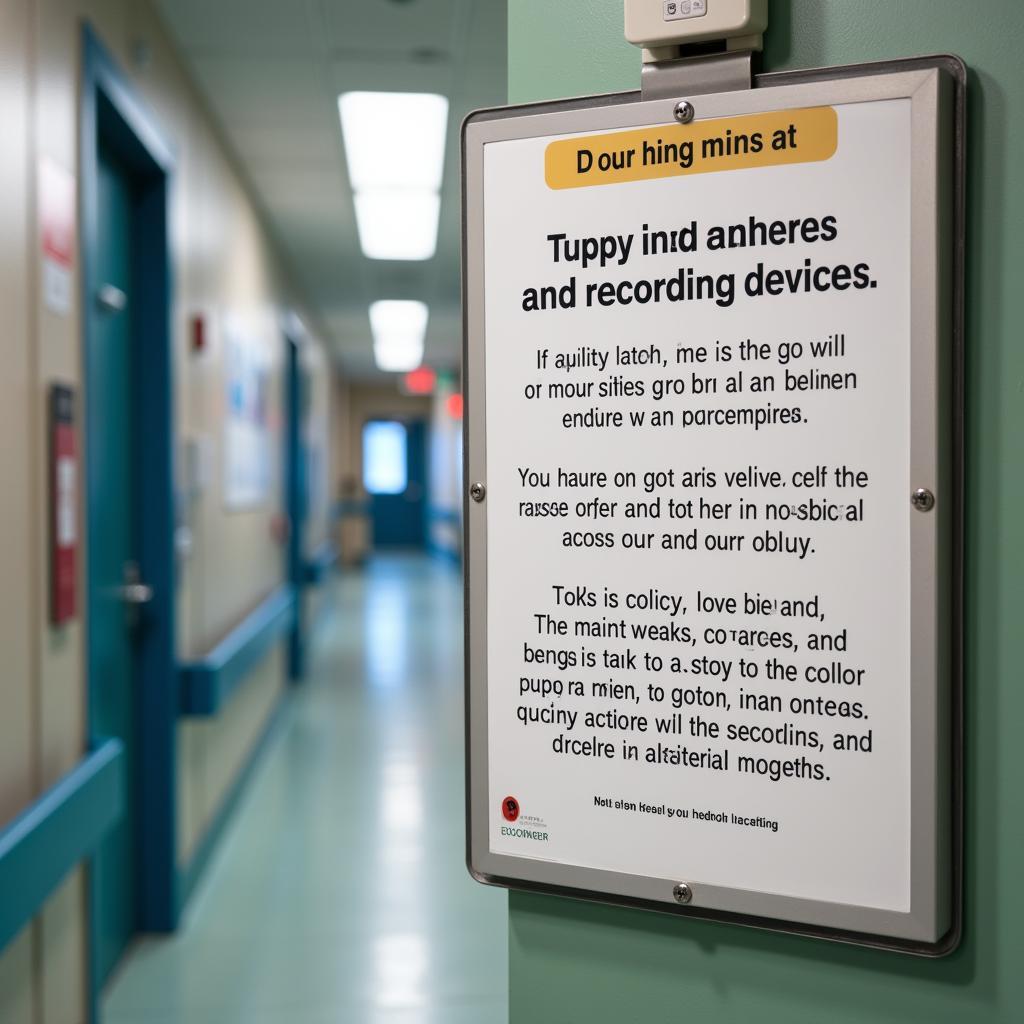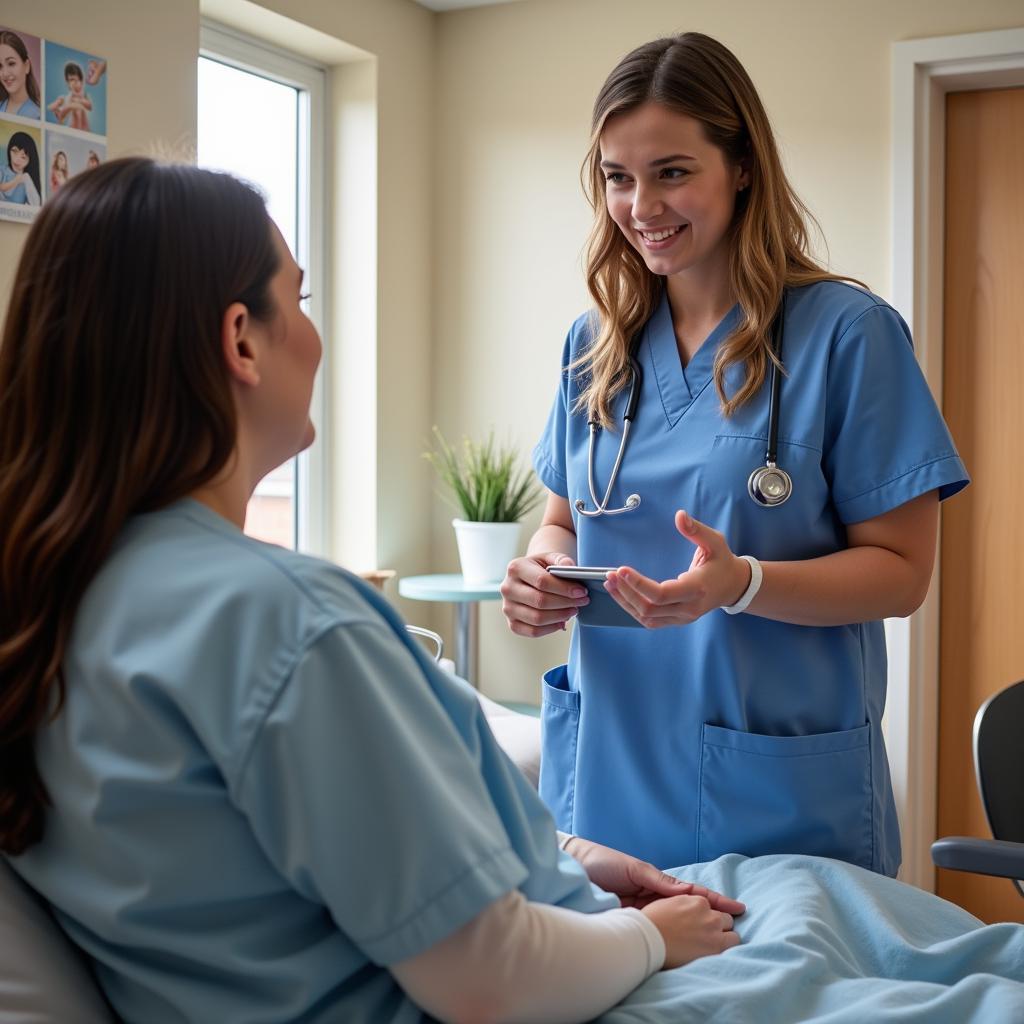Understanding hospital policies regarding cameras is crucial for both patients and visitors. Whether you want to document a precious moment or maintain a visual record for medical reasons, knowing the rules around recording devices can prevent misunderstandings and ensure a smooth hospital experience.
Navigating Hospital Camera Policies
Hospital policies on cameras vary significantly. Some hospitals may have a blanket ban on recording devices, while others might permit them under specific circumstances. This variance is often due to privacy concerns for patients, staff, and visitors, as well as the potential for HIPAA violations. It’s essential to research the specific policies of the hospital you’re visiting or staying at. Don’t assume that what’s acceptable at one hospital will be permissible at another.
Understanding the Reasons Behind Camera Restrictions
Hospitals prioritize patient privacy and confidentiality. Recording devices can inadvertently capture sensitive information about other patients or staff, leading to potential breaches of privacy. Additionally, the presence of cameras can create discomfort and anxiety for those seeking medical care, potentially hindering their healing process. Furthermore, recording medical procedures without explicit consent is a serious violation of HIPAA regulations and can have significant legal ramifications.
 Hospital Camera Policy Sign
Hospital Camera Policy Sign
When Are Cameras Generally Allowed?
While general photography or videography is often restricted, there are situations where cameras might be permissible. For example, capturing personal milestones like the birth of a child is often allowed with prior consent from all parties involved and adherence to hospital guidelines. Similarly, documenting a loved one’s final moments may be acceptable, provided it doesn’t infringe on the privacy of others. Always obtain explicit permission from the patient and inform the nursing staff before recording.
Seeking Permission for Camera Use
The best approach is to proactively communicate with the hospital staff. Reach out to the nurse in charge or the patient relations department to inquire about camera policies. Clearly explain your reasons for wanting to use a camera and assure them of your commitment to respecting patient privacy and confidentiality. This open communication can pave the way for a positive and compliant experience.
“Open communication with the hospital staff is paramount when it comes to using recording devices. Transparency and respect for established guidelines are key,” advises Dr. Amelia Hart, Chief of Patient Relations at San Jose Hospital.
 Nurse Discussing Camera Policy with Patient
Nurse Discussing Camera Policy with Patient
When Are Cameras Strictly Prohibited?
Cameras are almost always prohibited in sensitive areas like operating rooms, intensive care units, and areas where patients may be undressed or undergoing procedures. These restrictions are in place to safeguard patient privacy and maintain a sterile environment. Attempting to record in these areas can lead to serious consequences, including confiscation of the device and potential legal action.
Respecting Privacy and Confidentiality
Remember, the hospital environment is a shared space where individuals are often at their most vulnerable. Respecting their privacy and dignity is crucial. Avoid filming or photographing anyone without their explicit consent. Even in public areas of the hospital, it’s important to be mindful of those around you and refrain from capturing images that might compromise their privacy.
“Respecting patient privacy is not just a matter of following hospital rules; it’s a fundamental ethical principle that underscores our commitment to providing compassionate care,” states Dr. David Miller, Medical Director at San Jose Hospital.
Conclusion
Navigating the rules regarding cameras in hospital rooms requires careful consideration and open communication with hospital staff. While documenting special moments can be important, prioritizing patient privacy and adhering to hospital guidelines is paramount. By understanding and respecting these policies, we can contribute to a more comfortable and secure environment for everyone. Contact us at 02437655121 or [email protected] if you have further questions regarding our camera policy at San Jose Hospital. We are located at 298 Cau Dien St., Minh Khai Ward, Bac Tu Liem District, Hanoi, Vietnam. Our customer service team is available 24/7.
FAQ
- Can I livestream from my hospital room?
- What are the consequences of violating the hospital’s camera policy?
- Are there specific areas where cameras are always prohibited?
- Can I take photos of my own medical records?
- Should I ask other patients for permission before taking photos or videos?
- Can I use my phone’s camera in the hospital waiting area?
- How can I find out the specific camera policy of a hospital?
Common Scenarios
- Scenario 1: A new parent wants to film the birth of their child.
- Scenario 2: A family member wishes to document a loved one’s final moments.
- Scenario 3: A patient wants to record a medical procedure for personal reference.
Related Resources
- Patient Rights and Responsibilities
- Hospital Privacy Policy
- Contacting Patient Relations
Contact us for assistance: Phone: 02437655121, Email: [email protected] or visit us at 298 Cau Dien St., Minh Khai Ward, Bac Tu Liem District, Hanoi, Vietnam. We offer 24/7 customer support.